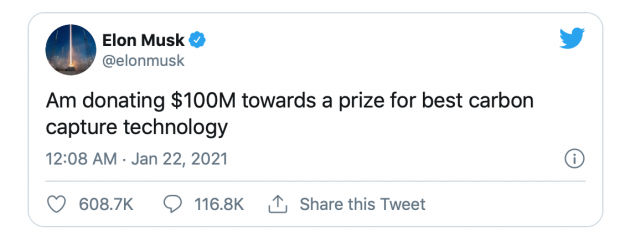Carbon capture and storage (CCS) often divides opinion as a climate change solution, but the technology received high-profile backing in January in the form of a tweet from Elon Musk. The Tesla billionaire announced that he would contribute a $100 million to a prize for the best carbon capture technology – details are expected to follow.
While the announcement has been generally welcomed by more established advocates for CCS, it may not be the game changer Musk imagines. Carbon capture technologies have been under development for decades, and have already been successfully used to capture emissions from a handful of polluting plants, often using the CO2 to boost oil well production. Nevertheless, the fundamental process of separating CO2 from other gases still comes at a fairly significant cost, so the idea of a revolutionary new technology continues to tantalise researchers. These innovations often revolve around novel materials which are able to isolate the greenhouse gas in some way, either by reversibly binding it or transporting it through a thin membrane. The aim is to reduce both the energy consumed by the capture process and the cost of the equipment itself, although achieving these goals together is challenging.
Musk’s prize may be used to help one of the more promising new technologies push through the so-called developmental ‘valley of death’ – a phase of large-scale testing which is often not covered by state research funding, but is of no commercial interest for big business. However, there is actually declining interest among CCS backers for early-stage research, with many seeing the endless quest for a ‘unicorn’ technology as a distraction from the pressing business of using the technologies we have available now. Often originally based on established processes from other industries, these have already been proven at large scales, and have been gradually optimised to reach efficiency levels which are pushing the boundaries of what is physically possible. And while it will no doubt be welcomed by the winning contender, the billionaire’s offer is relatively small beans compared to the funding already invested in CCS research and development through government and corporate programmes.
Does Elon Musk’s huge global profile bring more to the table for CCS than the prize itself? Although the technology tends to feature heavily in sober analysis of pathways to ‘net-zero’ or the Paris Agreement targets, it has suffered from a shortage of popular or political support. The idea of pumping CO2 deep underground is easily framed as an impractical and unsustainable solution, with connotations of established industries simply ‘sweeping the problem under the carpet’. In that sense, Musk’s reputation as a something of a sci-fi innovator – whose futuristic ambitions include the Hyperloop vacuum train system and ‘building a city on Mars’ – perhaps does little to normalise carbon capture as a solution for today.
Nevertheless, all publicity is good publicity, and the announcement comes at a time of general revival of policy interest in carbon capture – largely driven by the reality of challenging climate targets. If the technology is to really make a difference, this interest will need to rapidly translate into projects on the ground, and there is no time to wait for tomorrow’s solutions. Establishing this initial wave of CCS development will build confidence in a visible, viable industry and be just as important for driving innovation as Musk’s millions.
Toby Lockwood






